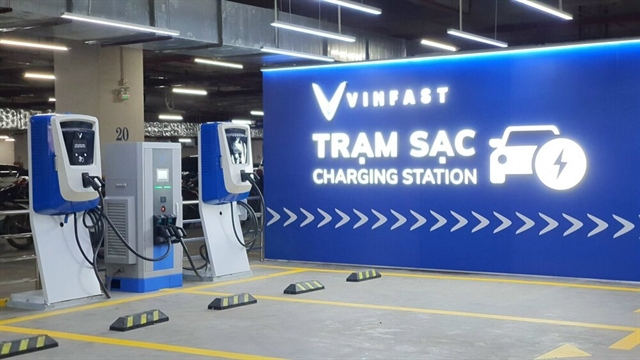 Economy
Economy


|
| A charging station of VinFast in a parking area in Hà Nội. Electric cars need a synchronous infrastructure in many localities. — Photo courtesy of VinFast |
HÀ NỘI — The development of electric cars in Việt Nam will depend on three major pillars, including the legal framework, support policies from the Government and synchronous infrastructure to encourage people to use electric vehicles, according to director of VinFast charging station development centre Vũ Thắng.
Thắng said in Việt Nam, policies to encourage the development of electric vehicles (EVs) remained modest. The development of EVs has so far received preferential tax rates such as excise tax and registration fees. There are not many general standards and charging stations for the development of EVs.
Except for VinFast, no domestic manufacturers have seriously invested in developing electric cars, to date. The company had to apply its standards relying on international ones.
Thắng noted that, unlike electric scooters that can be charged at home, electric cars need a synchronous infrastructure in many localities. The prerequisite for electric cars is the development of infrastructure such as charging stations. This needs to be one step ahead to clear the way for electric cars. To encourage private businesses to join in building charging stations, more specific policies from the Government are needed.
Asked about the difficulties facing VinFast, Thắng said the lack of a legal framework, standards and regulations from authorised bodies is posing a great challenge for the company. Currently, the Ministry of Science and Technology has just conducted regulations and standards on charging stations but they are insufficient. VinFast had to apply standards in line with international ones in building charging stations. The lack of component supply has impacted the production of charging posts. VinFast has worked with well-known manufacturers of charging posts to solve this problem.
The company has coped with difficulties in installing charging stations in 63 cities and provinces. He attributed the difficulties to a lack of legal documents to instruct the installation of a charging network from authorised bodies.
Moreover, power supply for charging stations is also a problem. In some provinces, charging stations are built in remote areas that are far from the power grid. Local bureaucratic hurdles also hinder the construction of power projects such as site clearance and land compensation. To deal with the hurdles, VinFast has studied to apply solutions on power storage to minimise reliance on the power grid.
Thắng added that VinFast will conduct solutions to ask users to charge at off-peak hours to avoid causing electrical overloading as demand for the use of EVs increase.
VinFast has been building about 3,000 charging stations with 150,000 charging posts nationwide at locations such as buildings, parking lots, bus stations, and rest stops on highways and shopping malls as well.
At a seminar held this month to discuss the development of EVs toward green energy transition, Deputy Minister of Transport Lê Anh Tuấn said the transport sector consumes over 55 per cent of the petrol volume and emits nearly 25 per cent of total carbon dioxide (CO2) in the world. Up to 17 per cent of them are used by road vehicles.
To deal with air pollution in the transport area, the use of EVs is considered the best solution. Data from the Vietnam Register showed that as of August, there were nearly 3,000 assembled and imported electric automobiles nationwide, a 20-fold increase from 2019. To date, nearly 1.8 million electric motorbikes and automobiles are running across the country. — VNS




